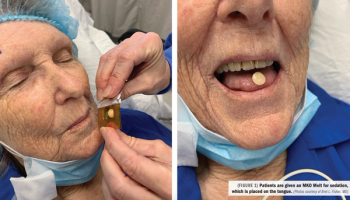
JCAHO goals aim to improve patient safety
Oakbrook Terrace, IL—The Joint Commission on Accreditation of Healthcare Organizations (JCAHO) will try to improve communications among caregivers and improve medication safety as part of its 2006 National Patient Safety Goals and Requirements.
Oakbrook Terrace, IL-The Joint Commission on Accreditation of Healthcare Organizations (JCAHO) will try to improve communications among caregivers and improve medication safety as part of its 2006 National Patient Safety Goals and Requirements.
The requirements, updated each year by an expert panel, apply to ambulatory care facilities and hospitals.
Additions to this year's list include a new requirement to standardize the "hand-offs" of patients between caregivers, with particular emphasis on assuring the opportunity to ask and respond to questions, and a second that specifies that all medications be labeled.
The organization wants to see a policy or procedure in place to ensure proper communication of patient status with an opportunity to ask questions, Dr. Croteau said.
The group also is making labeled medications a priority. Traditionally, operating rooms rejected labels because they were not sterile, but sterile labels are available now, he noted.
"We have quite a few cases of patients dying as a result of injection of the wrong medication or something that isn't even the medication, including preservatives for biopsy specimens, cleaning fluids, and a number of these cases involve children," Dr. Croteau said.
A critical barrier to improving operations has been a reluctance to talk openly about problems, he said.
"We're seeing very gradually a change in the culture where people are becoming a little more aware that this is a real problem, and talking about it and coming up with solutions that really do help," he added.
Since 2003, the group has used safety goals to highlight certain points in health care facility surveys, which occur about every 3 years. JCAHO has been studying adverse events and their causes since 1995.
"We are confident that accredited facilities will integrate these requirements into their efforts to redesign internal systems to avoid unnecessary patient disabilities and loss of life," said Dennis S. O'Leary, MD, JCAHO president.
As is its custom, the group retired two requirements: one to remove concentrated electrolytes from patient care units, and another to ensure free-flow protection on all general-use and patient-controlled analgesia intravenous infusion pumps.
The 2006 Ambulatory Care and Office-Based Surgery National Patient Safety Goals aim to improve the accuracy of patient identification; improve the effectiveness of communication among caregivers; improve the safety of using medications; reduce the risk of health care-associated infections; accurately and completely reconcile medications across the continuum of care; and reduce the risk of surgical fires.
Visit the JCAHO Web site,
Newsletter
Don’t miss out—get Ophthalmology Times updates on the latest clinical advancements and expert interviews, straight to your inbox.





























